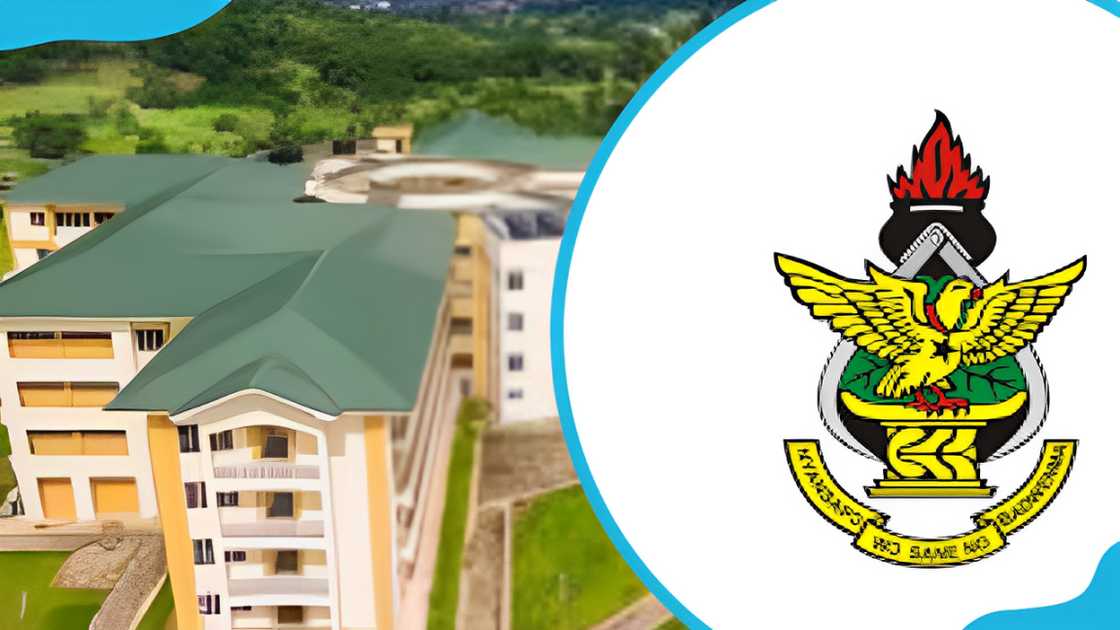For those looking to begin or further their university studies in Ghana, Kwame Nkrumah University of Science and Technology (KNUST) is one of the best options to consider. KNUST now offers a diverse range of programmes across multiple disciplines. We break down KNUST courses and cut-off points to help you make informed academic choices.

Source: UGC
TABLE OF CONTENTS
Key takeaways
- KNUST is one of Ghana’s top-ranking universities and a leading institution in West Africa for science and technology education.
- The university offers various undergraduate and postgraduate courses across disciplines like engineering, medicine, arts, law, and business.
- Admission to KNUST is highly competitive, with specific cut-off points varying by course and programme.
- KNUST collaborates internationally with several universities and organisations, enhancing student exchange and research opportunities.
KNUST courses and cut-off points for 2026
Understanding the university’s courses and cut-off points will help prospective students know the available programmes and the qualifications needed for admission. Explore more below.
Group A (Biological Sciences)
Here is a look at the different KNUST health courses and cut-off points. Students looking to enrol in any of the programs can apply.
| Course | Cut-off points |
| BSc. Agricultural Biotechnology | 19 |
| BSc. Agricultural Management | 18 |
| BSc. Agriculture | 24 |
| BSc. Aquaculture and Water Resources Management | 24 |
| BSc. BDS (Dental Surgery) | 8 |
| BSc. Biochemistry | 10 |
| BSc. Biological Science | 12 |
| BSc. Environmental Sciences | 17 |
| BSc. Herbal Medicine | 16 |
| BSc. Human Biology (Medicine) | 6 |
| BSc. Midwifery | 10 |
| BSc. Natural Resources Management | 20 |
| BSc. Nursing | 9 |
| BSc. Physician Assistantship | 7 |
| BSc. Medical Imaging | 10 |
| BSc. Physiotherapy and Sports Science | 14 |
| Doctor of Optometry | 6 |
| Veterinary Medicine | 15 |
| Pharmacy | 6 |
Group B KNUST (Physics and Engineering)
The institution has 26 undergraduate courses under the physics and engineering cluster. Here is a look at the KNUST engineering courses and cut-off points.
| Course | Cut-off points |
| BSc. Actuarial Science | 11 |
| BSc. Automobile Engineering | 14 |
| BSc. Biomedical Engineering | 7 |
| BSc. Chemical Engineering | 10 |
| BSc. Chemistry | 18 |
| BSc. Civil Engineering | 10 |
| BSc. Computer Engineering | 9 |
| BSc. Computer Science | 11 |
| BSc. Electrical/Electronic Engineering | 7 |
| BSc. Geological Engineering | 13 |
| BSc. Geomatics (Geodetic) Engineering | 14 |
| BSc. Industrial Engineering | 15 |
| BSc. Marine Engineering | 12 |
| BSc. Materials Engineering | 14 |
| BSc. Mathematics | 18 |
| BSc. Mechanical Engineering | 10 |
| BSc. Metallurgical Engineering | 16 |
| BSc. Meteorology and Climate Science | 21 |
| BSc. Petrochemical Engineering | 9 |
| BSc. Petroleum Engineering | 7 |
| BSc. Physics | 21 |
| BSc. Quantity Surveying and Construction Economics | 14 |
| BSc. Statistics | 16 |
| BSc. Telecommunication Engineering | 11 |
| BSc. Agricultural Engineering | 16 |
| BSc. Aerospace Engineering | 9 |
Group C (Technology and Social Sciences)

Source: Facebook
This is the most significant course cluster at KNUST. Here is a look at the general arts courses offered in KNUST and their cut-off points.
| Course | Cut-off points |
| B.Ed. Junior High School Specialism | 24 |
| BA. Communication Design (Graphic Design) | 14 |
| BA. Communication Studies | 12 |
| BA. Culture and Tourism | 16 |
| BA. Economics | 13 |
| BA. English | 20 |
| BA. French and Francophone Studies | 15 |
| BA. Geography and Rural Development | 14 |
| BA. History | 18 |
| BA. Linguistics | 22 |
| BSc. Fashion Design | 16 |
| BSc. Ceramics Design Technology | 24 |
| BSc. Metalsmithing and Jewellery Technology | 24 |
| BSc. Textile Design and Technology | 18 |
| BA. Integrated Rural Art and Industry | 19 |
| BFA. Painting and Sculpture | 20 |
| BA. Political Studies | 11 |
| BA. Publishing Studies | 16 |
| BA. Religious Studies | 24 |
| BA. Sociology | 14 |
| BSc. Business Administration | 10 |
| BSc. Hospitality and Tourism Management | 13 |
| BSc. Construction Technology and Management | 14 |
| BSc. Development Planning | 12 |
| BSc. Human Settlement Planning | 16 |
| BSc. Land Economy | 9 |
| BSc. Real Estate | 13 |
| LLB | 6 |
| BSc. Disability and Rehabilitation Studies | 17 |
What are the KNUST undergraduate entry requirements?
Here is a look at the basic entry requirements for KNUST undergraduate students.
- Have three credits in core subjects (English, Integrated Science, and Mathematics)
- Credits in three WASSCE/SSSCE elective disciplines relevant to the course one wants to undertake, or the following;
- An equivalent of the relevant program with an aggregate of 24 or better (WASSCE: A 1-C6/SSSCE A-D). D7, E8 & F9 are not acceptable for KNUST admission.
- International Baccalaureate holders need grades four and above at a higher level in three relevant subjects. A minimum grade of 5 is required for Health and Allied Sciences and Engineering.
Where is KNUST located?
The institution is in Kumasi, in the Ashanti region of Ghana.
When was KNUST established?
The institution was established in 1951. At the time, it was known as the Kumasi College of Technology. It attained university status in 1961 and began awarding degrees in 1964.
What is KNUST’s student population?
The university currently has slightly over 23,000 students.
What are the courses offered at KNUST and their cut-off points?
KNUST has various programs ranging from the technology sector to the non-technical field. They offer courses under six colleges, namely:
- The College of Agriculture and Natural Resources
- The College of Art and Built Environment
- The College of Humanities and Social Sciences
- The College of Engineering
- The College of Health Sciences
- The College of Science
Does KNUST take D7?
No. D7 and F9 are not acceptable for any course offered in a technology-driven institution. Only candidates with A1, B2, B3, C4, C5, and C6 in their WASSCE examinations qualify for admission. Those with an F in their SSSCE are also excluded from applying for KNUST courses.
Does KNUST take E8?
No, it does not. Only candidates with A1, B2, B3, C4, C5, and C6 in their WASSCE examinations qualify for admission. SSSCE candidates with A, B, C, and D grades also qualify to apply for KNUST enrolment.
What are the KNUST courses and cut-off points for nursing?
The cut-off point for a bachelor’s degree in nursing at KNUST is 9 points.
Is the KNUST 2025-2026 admission form out?
Yes. KNUST’s undergraduate application for the 2025/2026 academic year is now open. Prospective students can purchase the admission e‑voucher and begin applying via the official KNUST admission portal.

Source: UGC
How do you know if KNUST has admitted you?
To know if KNUST has admitted you, log in to the KNUST admissions portal using your credentials and check your application status. You will see a message confirming your admission and instructions for the next steps if admitted.
What is the cut-off point for studying medicine at KNUST?
The cut‑off point for studying BSc. Human Biology (Medicine) at KNUST is an aggregate score of 6 in the WASSCE grading system.
You can contact the following official contacts if you have any questions or need assistance.
- Physical location: Kumasi, Ashanti, Ghana
- Phone 1: +233 3220 60444
- Phone 2: +233-3220-61831
- Fax: +233 3220 60137
- E-mail: [email protected]
Over time, KNUST has become one of the most reputable universities in Ghana, offering numerous exciting courses for students. Knowing the various KNUST courses and cut-off points is essential for those looking to join the institution.
Yen.com.gh recently published an article about the general arts courses offered at the Kwame Nkrumah University of Science and Technology (KNUST). The institution was established in 1951 and now has a student population exceeding 63,000.
KNUST is renowned for its wide range of courses that are available to learners. These include science, technology, business, law, and arts courses. The general art courses at the university are numerous and are designed to prepare learners for various economic, political, and social sectors.
Source: YEN.com.gh
Source: Yen.com.gh

















